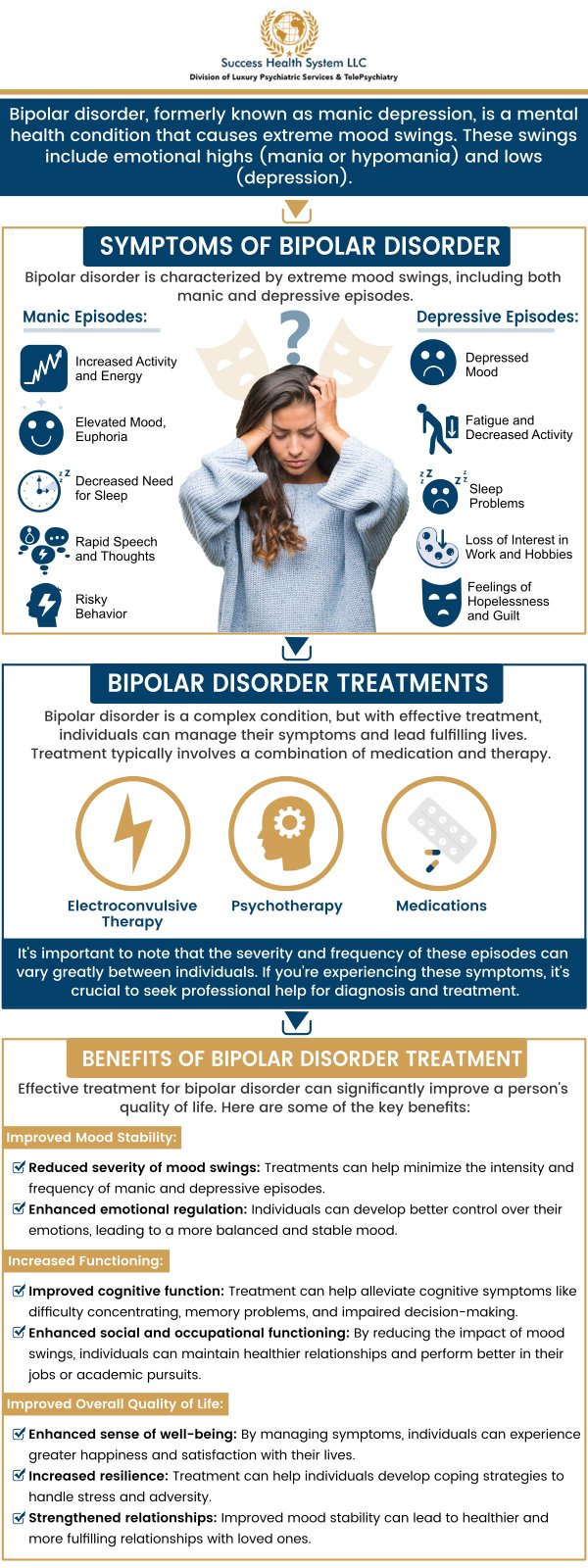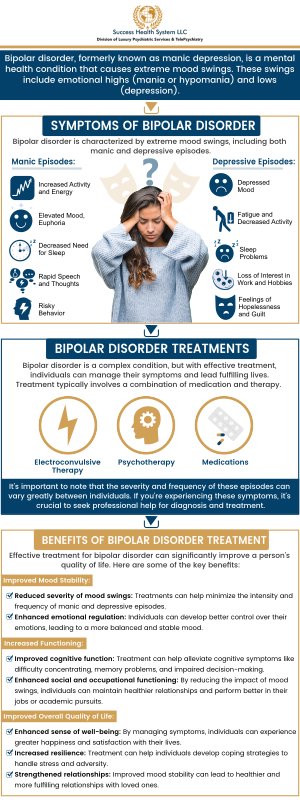Bipolar Disorder Treatment Specialist in Independence, MO
Bipolar disorder is a mood disorder characterized by extreme mood swings, ranging from manic highs to depressive lows. At Success Health System, Dr. Moses Tabe Ambilichu, M.D., a board-certified psychiatrist and mental health specialist, specializes in diagnosing and treating bipolar disorder. With personalized care, Dr. Ambilichu helps individuals manage their symptoms and improve their quality of life. For more information, contact us today or schedule an appointment online. We are conveniently located at 4429 S River Blvd Ste D, Independence MO, 64055.




Table of Contents:
What are the symptoms of bipolar disorder?
Is bipolar disorder the same as depression?
How do you treat bipolar disorder?
Despite being a relatively common mental health condition, bipolar disorder can be difficult to diagnose, which is why it is so important to seek professional medical help as soon as you or a loved one notices that there is something wrong with your emotional well-being. At Success Health System, we offer diagnosis and ongoing treatment for patients with manic and depressive symptoms that could be indicative of bipolar disorder. We offer comprehensive, compassionate care at our convenient locations in Creve Coeur MO, Independence MO and Columbia MO.
Bipolar disorder is a mental health condition marked by dramatic shifts in mood, energy, and activity levels. These shifts include manic or hypomanic episodes, where a person feels unusually high energy, euphoria, or irritability, and depressive episodes, characterized by deep sadness, fatigue, and a lack of interest in daily activities. The intensity and duration of these mood swings can vary, with some individuals experiencing more frequent episodes than others.
While the exact cause of bipolar disorder remains unclear, it is thought to result from a combination of genetic predisposition, chemical imbalances in the brain, and external life stressors. Family history plays a significant role in risk, suggesting a genetic connection. Proper diagnosis typically involves a comprehensive evaluation by a mental health professional, and while bipolar disorder cannot be cured, it can be effectively managed with a tailored treatment plan involving medication, therapy, and lifestyle adjustments to help maintain emotional balance and overall well-being.
Symptoms for bipolar disorder can vary depending on the individual and how severe their condition is. The most obvious and common symptom is a tendency toward extreme mood swings. Often, these quick changes will be first noticed by friends or family as a person’s outlook and behavior can change quickly and drastically. While many people may think that these mood swings will mean a person is either very happy or very depressed, it can actually point toward manic behavior that may manifest not only as a happy and positive attitude, but as obsessive or repetitive behavior, insomnia, and hyper-focus on a specific task or subject. Patients with bipolar disorder may also exhibit symptoms of depression, and could experience paranoia or panic if their condition worsens or goes untreated.
While those who have not known someone with bipolar disorder or experienced it themselves may think it is very similar to depression, they are not the same thing. Rather, depression is only one component of bipolar disorder. Patients with depression will experience deep sadness that does not dissipate even after depressing events may have passed. Bipolar disorder will manifest not only as depression but will also include periods of mania. The term bipolar refers to the extreme mood swings a person can experience when they have this disorder, often causing them to feel severely depressed for a long period of time before suddenly experiencing a manic episode. To complicate this disorder further, it is also possible for patients with bipolar disorder to experience both depression and mania simultaneously.
While some forms of depression can often be treated with psychotherapy alone, nearly all patients with bipolar disorder will require some kind of prescription medication to help stabilize their moods and allow them to maintain control over their emotions. These medications are designed to address chemical imbalances within the brain and body that can deregulate a person’s mood swings to the point where they are no longer able to function normally. Patients with a bipolar disorder diagnosis will also benefit from ongoing psychotherapy or cognitive behavioral therapy. Patients with bipolar disorder will need to develop a rapport with their therapeutic provider and build a trusting and open relationship. By doing so, you and your doctor can develop a comprehensive treatment plan that will reduce the chances of severe depressive or manic episodes, so you can live your life without interruption as a result of your mental health condition.
If you notice that you or someone you care about are experiencing mood swings that are well beyond what would be deemed normal and are concerned that bipolar disorder may be the cause, contact us today or schedule an appointment online. Our experienced psychiatrists and other medical professionals will provide you with the support you need to develop an effective treatment plan that will enhance your life for the better. We are conveniently located at 4429 S River Blvd Ste D, Independence MO, 64055. We serve patients from Independence MO, Raytown MO, Sugar Creek MO, Blue Springs MO, Kansas City MO, Lee’s Summit MO and surrounding areas.

Check Out Our 5 Star Reviews


Additional Services You May Be Interested In
▸Addiction Treatment
▸ADHD Treatment
▸Anxiety Treatment
▸Bipolar Disorder
▸Depressive Disorders
▸Mental Disorder
▸Obsessive Compulsive Disorders
▸Psychotic Disorders
▸PTSD Treatment
▸Phobias and Fears Therapist
▸Psychiatrist
▸Substance Disorder
▸Social Anxiety Psychiatrist
▸Medication Management
▸Psychotherapy
▸Exomind TMS – Columbia
▸Spravato – Independence

Additional Services You May Be Interested In
▸Addiction Treatment
▸ADHD Treatment
▸Anxiety Treatment
▸Bipolar Disorder
▸Depressive Disorders
▸Mental Disorder
▸Obsessive Compulsive Disorders
▸Psychotic Disorders
▸PTSD Treatment
▸Phobias and Fears Therapist
▸Psychiatrist
▸Substance Disorder
▸Social Anxiety Psychiatrist
▸Medication Management
▸Psychotherapy
▸Exomind TMS – Columbia
▸Spravato – Independence





